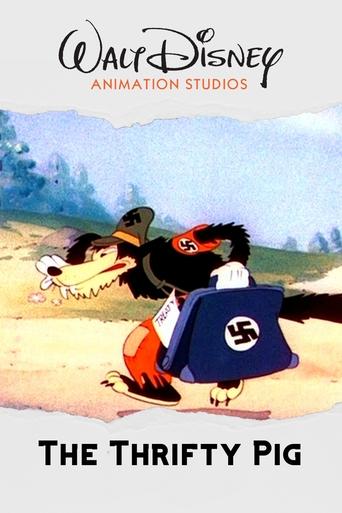MartinHafer
During WWII, the output of the major animation studios consisted, in large part, of various military training films, propaganda films and the like. Sure, they still made a few of the regular cartoons, but these were also made in much smaller numbers. "The Thrifty Pig" is an example of Disney helping with the war effort. In this case, it's to advocate for folks buying Canadian war bonds. And, since it's Disney, they've resurrected some of their old stars--the Three Little Pigs. By 1941, they were pretty much passé and I am not sure if they recycled some of the old film or if it was all new. I think it was all-new, as the Wolf, for example, looked much different--he was sporting a Nazi armband! It's also interesting that Disney didn't wait until the US entered the war, as this film debuted a month before Pearl Harbor.This preachy film begins with the pigs doing what they did in the original story...but with a twist. The two dumb pigs didn't plan for the future and built their crappy houses. But the smart one invested in bonds--which, somehow, made his house rock-solid. Following this and the obligatory wolf, the rest of the film consists of talk about the war effort and animated footage of the war production plants. For the most part, it is all very boring. But, historically speaking, it's an interesting glimpse into the times.
Chris Rebholz
This short was produced for the Canadian government. During WWII, war bonds were a critical part of financing the army. (This was true in the US as well.) The Canadian government asked the Disney studio for a cartoon to promote them, but only had a very small budget.The Disney folks kept the cost down by using existing footage of "The Three Little Pigs." There were only two real new animation pieces added. First, the third house's construction changed from red bricks to bricks made of war bonds. Second, the big bad wolf is now wearing some Nazi attire. Other than that, it's the same. Two of the houses are huffed and puffed down, etc. The most interesting thing about this animation is realizing how ubiquitous this sort of low-grade propaganda was during WWII, if you didn't live through it.

